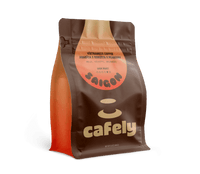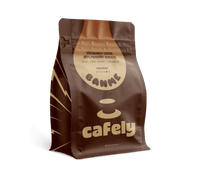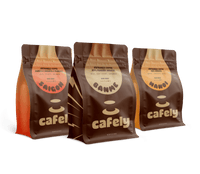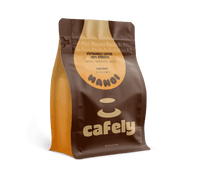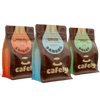When we think of coffee, we might not necessarily consider it to be a perishable item. We know we should use it within a certain timeframe to enjoy it at its best, but it’s probably not at the top of the list of items we consider dangerous to leave out or use beyond its expiration date.
In this article we explore whether coffee can truly go bad, what we can do to avoid it, and how long it can safely sit out at room temperature before you should throw it away.
How Long Can Coffee Be Left Out at Room Temperature?
Coffee can be left out and still safe to consume for up to 24 hours — but the flavor starts to deteriorate quickly. The speed of deterioration varies depending on the type of coffee you’re drinking, whether or not it has been stored correctly, and how it was brewed.
Let’s look at the guidelines for different types of coffee:
Hot Black Coffee
As black coffee contains no creamer or milk, it can be left out at room temperature for longer than its dairy-fueled counterparts.
Black coffee can sit out for 4–6 hours before its flavor is completely compromised. It will be safe to drink for up to 24 hours, although it begins to degenerate after 30 minutes.
After this time, it starts to lose some of its potency and flavor. The pleasant aroma fades, and the oil content begins to spoil, eventually resulting in a bitter taste.
Cold Brew Coffee
Cold brew coffee is less susceptible to oxidation than hot-brewed coffee, meaning it will retain its flavor profile for slightly longer despite being exposed to air.
Cold brew coffee can be left out at room temperature for up to 12 hours. Beyond this point, it gradually starts to become bitter and astringent.
Coffee With Creamer or Milk
Coffee containing coffee creamer or other dairy products will spoil far more quickly at room temperature than black coffee. The milk will curdle and go rancid over time— bacteria love nothing more than a warm and wet environment. Whether you’re using traditional dairy creamer or knowing how to make vanilla coffee creamer, the spoilage risk remains the same.
To avoid an upset stomach, consume coffee containing dairy products within 2 hours.
You can also store leftover coffee in the refrigerator, but discard it if it has been left out for more than 2 hours, and be especially careful to adhere to this timeframe in warmer weather. If you use a non-dairy alternative to milk or creamer, your coffee will stay fresh for longer.
Iced Coffee
Iced coffee can be left out at room temperature safely for up to 24 hours.
This style of coffee has greater longevity than coffee with milk or creamer in it. If you're making iced coffee at home and you add milk or creamer to it beforehand, it’s subject to the same rules as above and shouldn’t sit outside the fridge for longer than 2 hours.
What Causes Coffee to Go Bad?
Oxidation is a chemical process that occurs when the compounds in coffee meet the air. These compounds give coffee its pleasant aroma and flavor profile, but these aspects are lost as the lipids begin to degrade, resulting in a sour or bitter taste.
Exposure to high temperatures and moisture will also cause coffee to go bad. Both provide the perfect environment for bacteria and microorganisms to thrive, along with the potential development of mold. Not only do these cause the coffee to taste bad, but they also render it unsafe to drink.
How to Store Coffee Safely to Prolong its Life
Whether you’re storing brewed coffee or beans, you’ll want to follow these tips.
Storing Coffee Beans & Grounds
Store fresh coffee grounds in an airtight container away from direct sunlight in a cool, dark place. This will preserve your coffee’s smell and flavor for longer.
Stored correctly, high-quality coffee grounds can have a shelf life of up to 3–5 months, but they may lose some of their bold flavors beyond this time.
Storing Brewed Coffee
If you have made too much coffee for one sitting and are out and about, you can prolong the life of your brew by storing it in an airtight container, such as a thermos. This will slow down the oxidation process and make it last for a few more hours. If you’re at home, you can put the coffee in the refrigerator.
Remember that the refrigerator will extend the life of your brewed coffee, but we recommend that you discard it after two weeks. Beyond this point, the caffeine content will remain the same, but your coffee is likely to have lost some of its aroma and intensity, rendering it less enjoyable.
Can I Reheat Leftover Coffee?
You can reheat cold coffee, although you might notice the taste is slightly more bitter than when it was fresh. Coffee can be reheated in a saucepan or microwave, but be careful not to overheat it, as you’ll end up with a flavorless coffee or an unpleasant burnt taste.
When using the microwave, check for hot spots before drinking it.
How Do I Know If My Coffee Has Gone Bad?
How can I tell if it’s time to throw my coffee away?
1. Bad Smell
If you’ve found a packet of coffee beans lingering at the back of your cupboard and you aren’t sure whether or not they are still fit for consumption, appearance alone will not be the best way to judge their state — unless you adhere to expiration dates.
Fresh coffee beans look much the same as stale ones. However, your nose can tell you a thing or two. If your coffee beans or grounds have gone bad, they’ll smell ashy and dusty as opposed to giving off an appealing caramel-like aroma. If you’re detecting more bitterness than sweetness, or your coffee smells more like an ashtray, it’s time to ditch the packet and buy some fresh.
2. Horrible or Flavorless Taste
If your coffee looks and smells normal, leave the brewed coffee for a while before trying the taste test. Fresh coffee should have crema on the top. If it is completely black and the crema is absent, this suggests it’s on its way out. If you detect any sourness or citrus-like flavors, or the coffee doesn’t have any taste at all, it has gone stale.
3. Do the Ziplock Bag Test
If you are checking the freshness of coffee beans, you can get a good idea of their freshness by placing some in a ziplock bag and leaving them sealed inside overnight.
Fresh coffee beans release carbon dioxide, whereas stale beans do not. If the ziplock bag has puffed up overnight, then your beans are good to go, whereas a bag that remains flat suggests your beans are ready to be binned.
FAQs: Coffee Consumption, Storage, & Disposal
Still have unanswered questions about your coffee? Check out our FAQs below.
1. What happens if you drink bad coffee?
As long as there is no visible mold and no dairy in your cup, it will not harm you. It will likely taste horrible and might give you an upset stomach, but you are unlikely to consume enough bad coffee to cause negative side effects.
2. Can I store coffee in the freezer?
Provided it is packed properly, coffee can be stored in the freezer for up to 1 month. Ensure it is sealed in an airtight container or bag to make sure it does not absorb smells and flavors from other products.
3. What’s the best way to dispose of expired coffee?
It’s always a shame to throw out spoiled food and drink, but don’t despair. Coffee is organic and can be disposed of in a composter bin along with other food waste, which is a good way to give nutrients back to the soil. Your old coffee grounds can still be usable in gardening as a natural fertilizer, in skincare as an exfoliant, or even around the house as a deodorizer.
4. Why should I always buy fresh coffee?
Don’t waste your time buying discounted coffee that is close to its expiration date. It’s a false economy. Coffee should be an aromatic, bold-flavored treat to savor rather than a dusty, stale, or sour endurance test. Wherever possible, buy high-quality, fresh coffee for the tastiest results. We recommended trying either our SaiGon OG or our HaNoi coffee.
